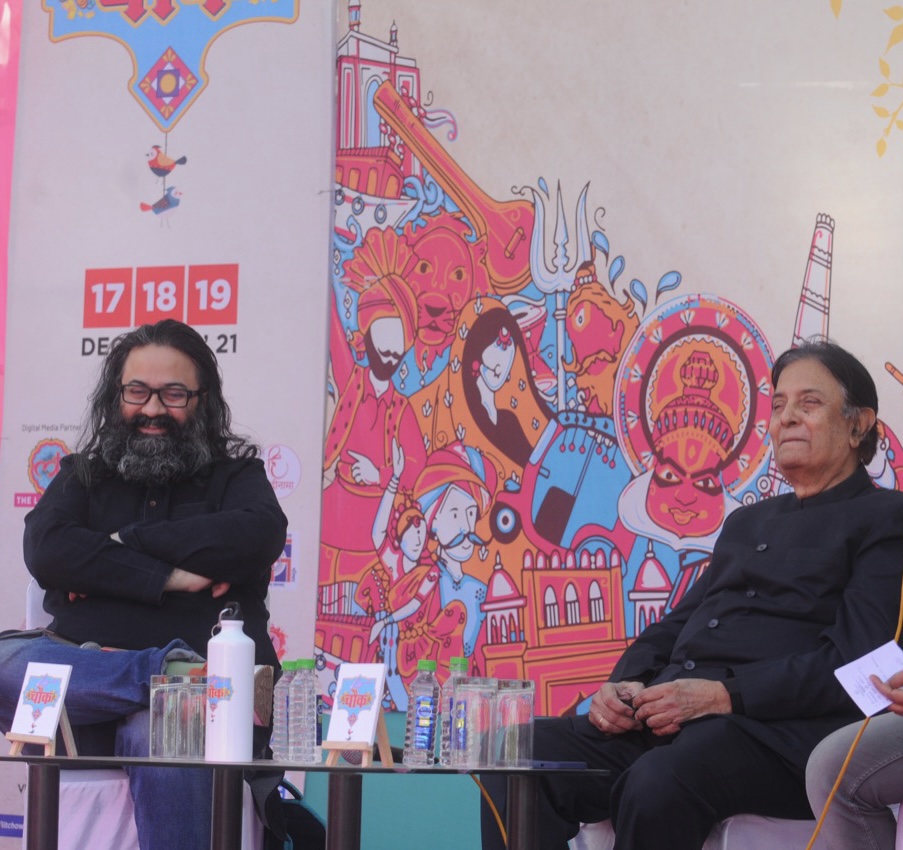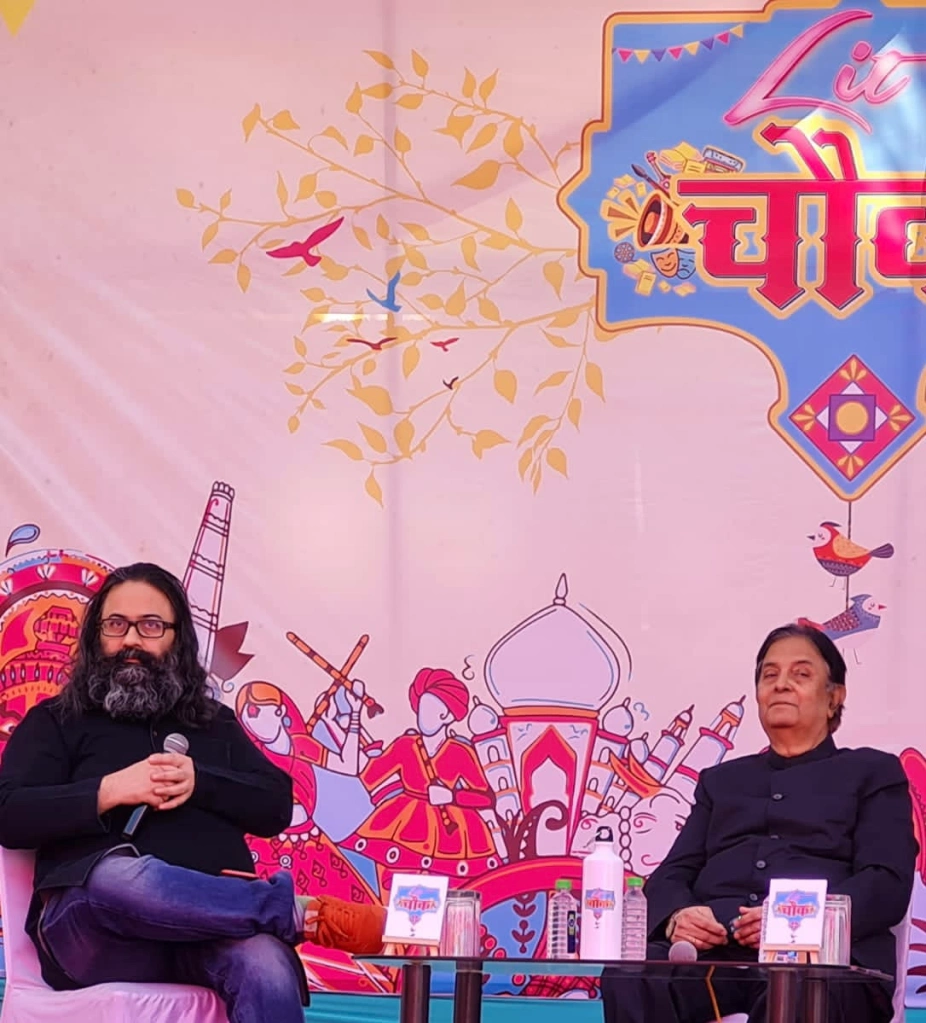Tagged: narendra
My father, those could-have-been-hugs, and Chitragupt
When I was growing up in Patna as a part of a large middle-class family, with a whole load of uncles and aunts, beautiful people, them all, staying under the same roof along with this set of four siblings that we were (Mummy created lots of babies while managing a household and playing a professor, but that’s for another post!), I don’t think there was any scope, or space, for some sort of a personal bonding with my father. And I don’t say this as a complaint. This is how things were. It was a large family. He was rigidly righteous and decisively democratic about sharing his affection with everybody, and definitely not concentrating only on his children. We were happy with what we got, and we got a lot. Even if he never verbalised it, even if he wasn’t loud about his feelings, even if he played the stricter parent, we knew.
The uncles and aunts got married. We got busy with our dreams and aspirations, eventually leaving home for colleges in cities far away. It was a pain departing every single time I went back to the University. Mummy would hide a tear, or two. I would act all grown up and macho. Papa would remain stoic. I suspect we even attempted a couple of awkward could-have-been-hugs in this phase of our lives.
The parents continued to teach at the Patna University till they both retired. The kids continued with their journeys. Considering the world would have stopped revolving if I were to take leave from my job at MTV, I didn’t really go home as often as I would have wanted to after I started working. Every time that I did, I would notice a fresh wrinkle, a new strand of grey, and a very charming couple growing old together, with the kind of love that is tough to acquire or achieve. There was one noticeable change in Papa, though. He had kind of started mellowing both as a person and a parent. But the expression of endearment still appeared the same. As muted. As sweet. He would now shake hands while seeing me off, his hand staying on mine for a couple of extra seconds. Or them last moment jaldi-jaao-flight-nikal-jaayegi hugs with quick, warm pats on the back.
I got them to Mumbai. The arrangement was that they would live independently, how they liked it, two buildings away from mine.
Mummy decided to embrace the retirement the way she wanted it, doing nothing (though I suspect she wouldn’t have said no to making a few more babies, her most favourite thing in the world). Papa decided to do everything that he wanted to. From playing Manoj Tiwary’s father in Bhojpuri films (Rinkiya ke Papa’s Papa is my Papa, thank you) to selling Chyawanprash with Alok Nath on teleshopping networks, and succeeding to embarrass me in the middle of the night every single night for months on national TV, to creating radio plays to writing books! At 70-something, he was glued to the computer, not to play Solitaire, but to research and write, and write and research.
Chal Ud Ja Re Panchhi, Dr. Narendra Nath Pandey’s third book, out now on Amazon, is a voluminous 2-part biography of yesteryear’s music director Chitragupt, of Teri Duniya Se Door Chale Ho Ke Majboor and Daga Daga Vai Vai Vai fame. Backed by more than three years of intense research, blessed by Lata Mangeshkar, with a foreword by Vishal Bhardwaj, and interviews with prominent music personalities, the book would be particularly useful to the aficionados and students of old Hindi film music, researchers and musicologists. Here’s the link for those who are interested: https://www.amazon.in/dp/939088568X?ref=myi_title_dp
I kind of helped with the soft launch of the book at LitChowk in Indore a few months back. It was surreal sharing stage with Papa, referring to him as Dr. Pandey, with Mummy in the audience. This was the first time that his beautiful labour of love was being presented to the world. Dressed in black, matching the fresh coat of black in his hair, my dapper dad talked effortlessly and earnestly about his favourite music director’s journey, complete with facts, anecdotes and explanations, and a lot of wonderful music. The audience lapped it up.
When we went backstage after the talk, I extended my hand for a handshake, congratulating him for a job well done. He looked at me, and all my readings of all his expressions all my life failed me at that one moment. Papa pulled me towards him, and gave me the tightest, warmest hug that could be.
It was my turn to not being able to verbalise what I felt. Also, I had to rush to the water cooler. There was something in my eyes.



Why Gajendra Chauhan is the greatest FTII Chairman EVER!
“What we cannot speak about, we must pass over in silence”, said Ludwig Wittgenstein in Tractatus Logico-Philosophicus. I have NO clue what that means or who Ludwig Wittgenstein was, but this sure makes my discourse esoteric and academic right at the outset! Almost like all the Bombay Velvet reviews. The only difference is that I actually am here to discuss academics today. Specifically, the appointment of Gajendra Chahuan (or Chouhan or Chauan depending on which stage of his numerically challenged life you are talking about) as the Chairman of Film and Television Institute of India.
There have been protests galore against the selection of Mr. Chauhan, the erstwhile Dharmaraja Yudhishthir from BR Chopra’s eponymous TV series Mahabharata, and the entire world seems to have colluded to collide with the coronation of Gajendra. They say that the legacy of the hallowed premises of FTII has to be respected and that he doesn’t have the vision or knowledge of cinema. That he has no experience in the field of academics. That he is the Caesar of C-grade cinema, with the C standing for very many things. That he is a bad actor and a stooge of the ruling political party. That he is an obtuse idiot, a bumbling moron and a blockheaded dimwit. Okay, the last bit was me taking poetic liberty, but, yeah, similar sentiments.
Well. I come to praise Caesar, not to bury him!
According to IMDB, Gajendra Chauhan started his career way back in 1985 with Main Chup Nahin Rahoongi. So 2015 marks his 30th year in Hindi Cinema. That’s a really really long time for a nasal-twanged-single-expressioned-monotoned-jumna-paar-drawl to survive in this very competitive industry. And that, by itself, should be the reason enough for all of us to embrace him with open arms. But let this not be the only reason to be dazed and dazzled by our man. For somebody whose body of work includes watching bodies at work in Vasna, Khuli Khidki, Reshma, Samri and Rupa Rani Ramkali, Chauhan deserves our prostration, obedience and submission, in anywhich order. Find me another actor who can abduct, molest and defile with just his eyes and a lubed mass of thick hair. And the naysayers can die.
Chauhan says he has been in the field of art for 34 years. That is just him being his regular modest and humble self. On the contrary, it is art that has been in the field of Chauhan for 34 years. From Awara Zindagi to Janam Se Pehle, from Jawani Jaaneman to Pathreela Rasta and from Gumnam Hai Koi to A Sublime Love Story: Barsaat, he has taken the service of every single dead cell generated by him to construct and deconstruct his histrionics. Sample the scene from Bhayaanak Panjaa (1997) in which he is being exorcised. It is sublime pantomime. And I just wanted that to rhyme. The technique of conveying emotions and feelings by the mere physicality of the actions is not something every thespian can master. But one look at Gajendra’s frenzied movement can make you immediately realise the years of hamheadeness that must have gone in perfecting that fall. Legendary.

The swagger comes naturally to the Chairman sir. And it is not just because he played Inspector Patil in Himmatvar (1996) or Mukesh Mathur in Vishwavidhata (1997) or Virendra Chaudhary in Arjun Devaa (2001) or Naresh Chand in Issi Life Mein…! (2010). These were, of course, author backed roles where he got the opportunity to stretch his awesome campiness to the fullest for those ten minutes that he was on screen. But the style and the charisma of the man is inherent to his schmaltzy Tank-Road-Jeans-Market self.

To those questioning his acting abilities, I just have one answer two answers. Jungle Love (1986) and Rupa Rani Ramkali (2001). Ah, those consciously constipated expressions where death becomes him. That fierce fervour, those extreme emotions, the deadly deluge. And the arbitrary alliterations.


Haters gonna hate his religious baggage thanks to the Mahabharat connect, but Chauhan never actually has tried overtly exploiting his Pitashri-Matoshri affiliations. Apart from the yet to be released Barbareek aur Mahabharat and Jai Maa Vaishnodevi (1994), mouthing Ayushman bhavah at party meetings and selling some random concoction on teleshopping networks, that is. Of course, the performer in him has been more satisfied with challenging roles like playing Rahul’s father in International Khiladi (1999), Pinky’s dad in Billa no. 786 (2000) and the car salesman in Baghban (2003). And the Ganesh fest dancer in Parwana (2003). Of course.


And so what if he knows people in the reigning political party! Mr. Chairman has worked hard to be where he is right now. The tonsils are getting their due. And deservedly so.
Eventually, the annals of time would judge Gajendra Chauhan on his performance as the FTII Chairman, protesters and wiseguys be damned. If not him, they would find another extremely talented Chauhan, suited perfectly for the job. So yeah. I just hope the hammer is restricted only to his acting skills while I gloat over my punnery.
“What we cannot speak about, we must pass over in silence”, said Ludwig Wittgenstein in Tractatus Logico-Philosophicus. I still have NO clue what that means or who Ludwig Wittgenstein was, but he was right. Exactly why you must forget about them protests already. Think of this as a long movie, treat this as a willing suspension of disbelief, and all would be good. Also, please slip in the word ‘pedantic’ somewhere in here to close the intellectual loop. Thank you.
PS: And now, thank me. Here.

